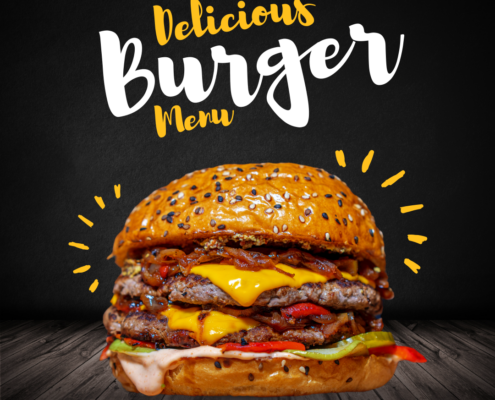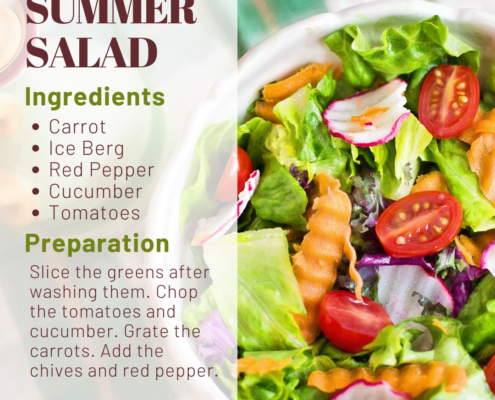Social Media Marketing Guide for Restaurants and Retail in 2024 (Download FREE Holiday Graphics)
If you are a restaurant or retail operator looking to grow your business, this social media marketing guide is for you! Download Social Media Holiday Graphics!
Nowadays, where every click and scroll translates to potential customer engagement, understanding the nuances of social media marketing is not just an option—it’s a necessity. Whether you’re the proud owner of a cozy local cafe, a trendy retail boutique, or an expanding restaurant chain, your online presence on social media platforms can significantly amplify your business’s reach and appeal.
Imagine a scenario where your competitor, with seemingly less to offer, attracts more customers daily. You’ve noticed they’re always posting on Instagram, engaging with followers on Facebook, and even trending on TikTok. It’s not magic; it’s strategic social media marketing, and it’s what’s setting them apart. This is where your journey begins – to not just level the playing field but to stand out.
But where do you start? How do you navigate this vast digital landscape without getting lost in the noise?
In this guide, we’ll show you how to leverage social media to bring that buzz to your doorstep.
What Is Social Media Marketing?
Social media marketing is the art of using online platforms to promote and grow your business. It’s a world where tweets can turn into sales, Instagram posts into bookings, and Facebook updates into customer engagement.
But it’s more than just posting pictures or announcements; it’s about creating a digital persona for your brand that resonates with your audience.
Think of social media as a bustling digital marketplace. Just as you’d decorate your shop window or design your restaurant’s menu to attract passersby, your social media profiles are your virtual storefronts.
They’re spaces where you can showcase your products, share your story, and connect with customers both near and far.
Why Social Media Marketing is Essential for Your Business
In today’s digital age, social media marketing is not just beneficial; it’s essential. Here’s why:
1. Reach a Wider Audience: Social media platforms are global. With billions of users across the world, they provide an unparalleled opportunity to reach a broader and more diverse audience. This exposure can significantly expand your customer base beyond your local area.
2. Cost-Effective Marketing: Compared to traditional forms of advertising like TV, radio, or print media, social media marketing is remarkably cost-effective. Many platforms offer free accounts, and even paid advertising options are relatively inexpensive. This level of affordability makes it accessible for businesses of all sizes.
3. Direct Customer Engagement: Social media allows you to engage directly with your customers. You can receive immediate feedback on your products and services, answer questions, and build relationships. This direct line of communication helps to foster trust and loyalty among your customers.
4. Boost Brand Awareness and Loyalty: Regularly posting on social media increases your visibility and helps keep your business top-of-mind. When customers see your brand’s personality and values reflected in your posts, it can enhance brand loyalty.
5. Trackable Results: With advanced analytics tools, social media platforms allow you to track the effectiveness of your marketing efforts in real-time. You can see which strategies are working, which aren’t, and adjust your approach accordingly.
6. Stay Ahead of Competitors: Many of your competitors are already using social media to their advantage. To stay competitive, you need to be where your customers are, engaging them with creative and relevant content.
7. Adapt and Respond Quickly: The fast-paced nature of social media means you can quickly adapt your strategy in response to new trends, customer feedback, or changes in the market.
8. Increase Website Traffic and Sales: Effective social media marketing can drive more traffic to your website, leading to increased sales. It’s an excellent tool for promoting new products, special offers, or events.
Top 5 Social Media Platforms for Your Business
Navigating the vast world of social media can be overwhelming. Here are the top 5 platforms that are most effective for restaurant and retail businesses:
1. Facebook
Why It’s Great: With billions active users, Facebook is the largest social media platform. It offers a diverse audience and powerful advertising tools.
Best For: Sharing news, events, and special offers; customer interactions through comments and messages; targeted advertising.
2. Instagram
Why It’s Great: Instagram is the king of visual content. Its focus on photos and videos makes it perfect for showcasing your products and services.
Best For: High-quality images of your products, behind-the-scenes stories, customer-generated content, and influencer marketing.
3. TikTok
Why It’s Great: TikTok’s rapidly growing platform focuses on short, engaging video content and has a large, young audience.
Best For: Creative, fun videos showcasing your brand’s personality, trending challenges, and viral content.
4. YouTube
Why It’s Great: As the second largest search engine, YouTube is ideal for longer-form content and storytelling.
Best For: How-to videos, product demonstrations, behind-the-scenes looks, and customer testimonials.
5. Pinterest
Why It’s Great: Pinterest is a visual discovery engine, great for inspiration and reaching a predominantly female audience.
Best For: High-quality images of your products, inspiration boards, and linking back to your website for increased traffic.
Each platform has its unique strengths and caters to different types of content and audiences. The key is to choose the ones that align best with your business goals and the preferences of your target customers.
Launching Your Social Media Marketing Strategy
Taking the plunge into social media marketing can be daunting, but with the right approach, it can be incredibly rewarding. Here’s how to get started:
1. Set Objectives
Define clear, measurable goals. Are you looking to increase brand awareness, boost sales, or engage with customers? Your objectives will guide your strategy.
2. Understand Your Audience
Who are your customers? What are their interests, behaviors, and demographics? Understanding your audience is key to creating content that resonates with them.
3. Research Competitors
Analyze what your competitors are doing on social media. What works for them? What can you do differently or better?
4. Select Social Media Platforms
Choose platforms that align with your objectives and audience. It’s better to be effective on a few platforms than to be present on all with little impact.
5. Develop Content
Plan and create content that aligns with your brand and speaks to your audience. Consistency is key, but so is creativity and quality.
6. Measure Success
Use analytics tools to track your performance. Look at engagement rates, follower growth, and conversion metrics to understand what’s working and what’s not.
Best Social Media Marketing Practices for Restaurants
For restaurants, social media isn’t just about showcasing your dishes; it’s about creating an experience that entices customers to walk through your doors. Here are some best practices:
1. Showcase Your Menu
Visual Appeal: Post high-quality, appetizing images of your dishes. Consider hiring a professional photographer or learn some basic food photography skills.
Menu Updates: Regularly update your followers about new menu items, seasonal specials, or any changes to your offerings.
2. Engage with Reviews and Customers
Respond to Reviews: Actively respond to reviews on social media, both positive and negative. This shows you value customer feedback and are committed to improving.
Customer Interaction: Engage in conversations, answer questions, and share customer posts that feature your restaurant. This builds a community around your brand.
3. Promotions and Exclusive Offers
Special Deals: Use social media to promote special deals, happy hours, or exclusive offers to your followers.
Contests and Giveaways: Engage your audience with fun contests or giveaways, encouraging them to visit your restaurant.
4. Behind-the-Scenes Content
Share the stories behind your dishes, introduce your staff, or show the preparation process. This gives a personal touch and builds a connection with your audience.
5. Utilize Stories and Live Features
Use Instagram Stories or Facebook Live to share daily updates, quick snippets, or live events happening at your restaurant.
6. User-Generated Content
Encourage customers to share their experiences and tag your restaurant. Reposting user-generated content builds authenticity and provides social proof.
7. Influencer Partnerships
Collaborate with local food bloggers or influencers to reach a wider audience. They can provide valuable exposure and credibility to your brand.
8. Consistent Branding and Tone
Ensure your social media profiles reflect your restaurant’s branding and tone. Consistency helps in building a recognizable and trusted brand identity.
Social Media Marketing Examples for Restaurants
Best Social Media Marketing Practices for Retail Stores
Social media for retail stores is about showcasing your products and creating a brand experience that resonates with your audience. Here are tailored best practices:
1. Product Highlights and Features
Showcase Products: Regularly post high-quality images or videos of your products. Highlight new arrivals, best-sellers, or unique finds.
Product Details: Provide valuable information about the products such as features, benefits, or styling tips.
2. Style Guides and How-Tos
Create Inspirational Content: For fashion or lifestyle retailers, share style guides, outfit ideas, or how-to videos. This not only showcases your products but also provides value to your customers.
DIY Content: For stores with craft or DIY products, sharing creative project ideas or tutorials can engage your audience and encourage product usage.
3. Customer Testimonials and Reviews
Share Customer Stories: Post testimonials or reviews from satisfied customers. This adds credibility and encourages potential customers to make a purchase.
Feature Real Customers: Use photos or stories of real customers using your products. It’s a powerful form of social proof.
4. Exclusive Online Promotions
Special Offers for Followers: Provide exclusive discounts or early access to sales for your social media followers. This can increase loyalty and encourage more people to follow your accounts.
Time-Limited Promotions: Create urgency with limited-time offers or flash sales announced on your social media channels.
5. Interactive Content and Polls
Engage Your Audience: Use interactive features like polls, quizzes, or Q&A sessions to engage your audience and gain insights into their preferences.
6. Event Promotion and Coverage
Promote In-Store Events: Use social media to promote in-store events, product launches, or special collaborations.
Live Coverage: Share live coverage of events to engage with followers who can’t be there in person.
7. Visual Merchandising
Virtual Storefront: Treat your social media pages like a virtual storefront. Showcase your visual merchandising skills, store layout, and the overall shopping experience.
8. Cross-Promotions and Collaborations
Collaborate with Brands or Influencers: Partner with complementary brands or influencers to reach new audiences and add variety to your content.
Social Media Marketing Examples for Retail Stores
Taking the Next Step in Your Social Media Marketing Activities
Hopefully, you now have more clarity on social media marketing and its crucial role in the success of your restaurant or retail business.
From harnessing the power of different platforms to implementing industry-specific best practices, you are well-equipped to begin your journey in the dynamic world of social media.
DIY or Professional Assistance: What’s Best for You?
The choice between diving into social media marketing on your own or enlisting professional help depends on various factors, including your time, expertise, and resources.
Do-It-Yourself: If you’re a small business owner who loves being hands-on, the DIY approach allows you to personally connect with your audience and grow your skills. It’s a learning experience, where every post and interaction can teach you more about your customers and your business.
Professional Assistance: However, managing social media effectively can be time-consuming and requires a certain level of expertise, especially if you want to maximize its potential. This is where professional assistance can be invaluable.
How eHopper Can Elevate Your Social Media Marketing
At eHopper, we understand the unique challenges and opportunities that come with social media marketing for restaurants and retail stores. Our team of experts is dedicated to creating compelling graphics and content tailored to resonate with your specific audience. We offer:
Customized Content Creation: Our creative team develops engaging, brand-aligned content that captures your business’s unique voice and appeals to your target audience.
Strategic Planning and Execution: We help in strategizing your social media campaigns, ensuring they align with your business goals and marketing objectives.
Analytics and Insights: With our tools and expertise, we monitor your social media performance, providing insights to continually refine and improve your strategy.
Time-Saving Solutions: Our services allow you to focus on running your business while we take care of building and maintaining your online presence.
Get Started with a Free Consultation
Whether you’re looking to do it yourself or considering professional assistance, the key is to start. And if you’re leaning towards expert help, we’re here for you.
Contact eHopper today for a free social media marketing consultation.
Let’s discuss how we can help bring your brand to life online, engage with your audience more effectively, and drive growth for your business. Your journey to social media success starts here!
Download Free Social Media Holiday Graphics










